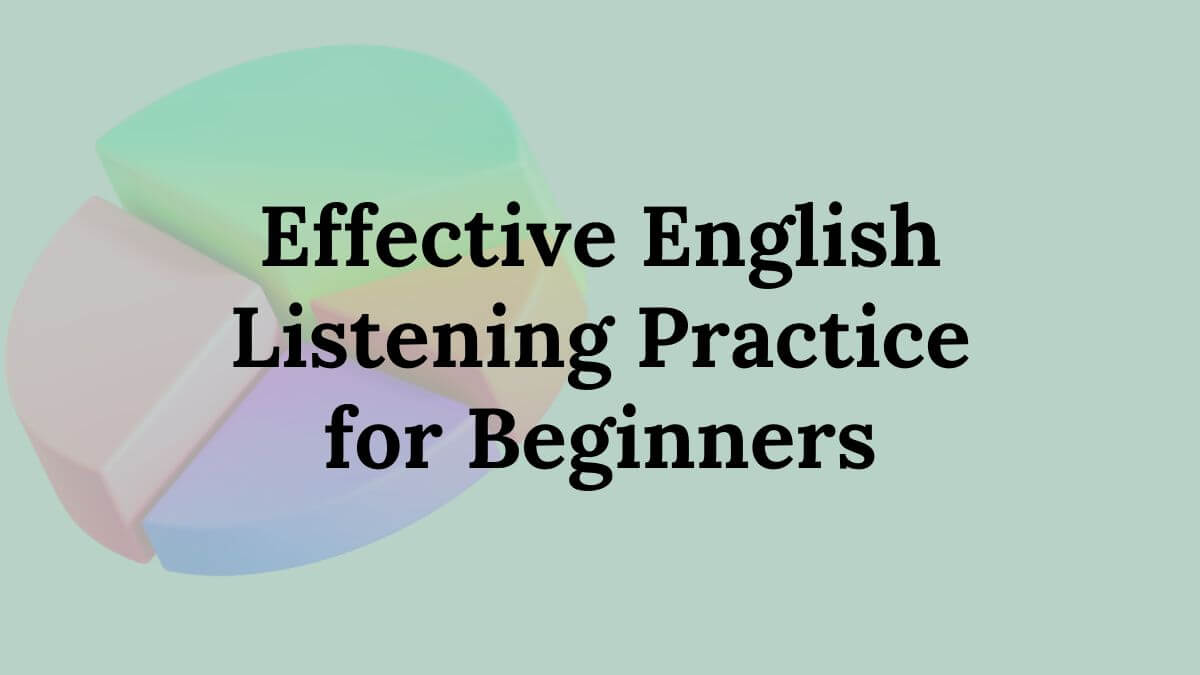Listening is one of the most important skills for learning English, but many beginners find it challenging. English Listening Practice helps learners improve comprehension, pronunciation, and overall communication skills. With regular practice, beginners can better understand spoken English in everyday conversations, classroom settings, and online interactions. In this article, we’ll explore 10 effective exercises designed to make English Listening Practice engaging and practical for learners at all levels.
Effective English Listening Practice Exercises for Beginners
Listening is one of the most important skills for learning English, especially for beginners. Many learners find it challenging to understand spoken English because of different accents, fast speech, or unfamiliar vocabulary. English Listening Practice exercises can make a huge difference. Beginners can start by listening to short, simple audio clips and repeating sentences aloud to improve pronunciation and rhythm. Focusing on keywords in conversations helps understand the main ideas without getting stuck on every word. Watching videos with English subtitles, doing dictation exercises, and answering questions about what you hear are also very helpful. Regular English Listening Practice, even for 10–15 minutes a day, can gradually improve comprehension, build confidence, and make understanding spoken English much easier in real-life situations. By committing to daily English Listening Practice, beginners can steadily enhance their listening skills and feel more confident communicating in real-world settings.
Beginner-Friendly English Listening Activities You Can Try Today
Listening is a key skill for learning English, and starting with simple, beginner-friendly activities can make the process easier and more enjoyable. These activities are designed to help learners improve comprehension, pronunciation, and confidence in understanding spoken English. By practicing with short conversations, audio books, podcasts, songs, and interactive apps, beginners can gradually get used to different accents, speech speeds, and everyday vocabulary. Regular practice not only strengthens listening skills but also enhances overall communication, making it easier to follow conversations, participate in discussions, and enjoy English media.
Boost Your Listening Skills with These Simple Exercises
Improving your English listening skills doesn’t have to be complicated. By practicing simple exercises regularly, beginners can quickly enhance their ability to understand spoken English in everyday situations. Exercises such as listening to short conversations, repeating sentences, following along with audio books, or using interactive apps help learners become familiar with different accents, speech patterns, and vocabulary. These activities not only improve comprehension but also build confidence, making it easier to engage in real-life conversations, follow lessons, or enjoy English media. Consistent practice with simple exercises is a practical way to boost listening skills step by step.
Practical English Listening Practice Exercises for Everyday Learning
Practicing English listening every day can make a big difference in how quickly you improve. Practical exercises, such as listening to short audio clips, following along with everyday conversations, or using language-learning apps, help learners understand real-life English more naturally. Incorporating listening into your daily routine even for just 10 15 minutes allows you to get used to different accents, speeds, and expressions. Over time, these simple, consistent exercises enhance comprehension, boost vocabulary, and make it easier to communicate confidently in everyday situations.
Fun and Effective Ways to Practice English Listening
Learning English listening doesn’t have to be boring. There are many fun and effective ways to practice that keep beginners engaged while improving their skills. Activities such as listening to songs, watching cartoons or TV shows, playing interactive language games, and following along with podcasts make learning enjoyable and memorable. These methods help learners pick up new vocabulary, understand natural speech patterns, and improve pronunciation without feeling like traditional study. By combining entertainment with learning, beginners can practice listening consistently and see real progress over time.
Why English Listening Practice is Important
Listening is the foundation of language learning. Without strong listening skills, it’s difficult to understand others, respond correctly, or communicate naturally. Practicing listening improves vocabulary, grammar understanding, and pronunciation. For beginners, structured exercises make listening less overwhelming and more productive.
Benefits of Listening Practice:
- Improves comprehension of spoken English
- Enhances pronunciation and speaking confidence
- Expands vocabulary naturally
- Helps understand different accents and speeds of speech
- Listening to Short Conversations
How it Works
Begin with short, simple conversations between two people. Focus on understanding the main idea rather than every word.
Tips for Beginners
- Replay the conversation multiple times
- Take notes of new words or phrases
- Try to summarize the conversation in your own words
Listening to short dialogues helps learners get familiar with natural speech patterns and conversational expressions.
- Using Audio Books
Why Audio Books Help
Audio books allow learners to listen to proper pronunciation and intonation while reading along with the text.
How to Practice
- Choose beginner-level books
- Listen and follow along with the written text
- Pause to repeat difficult words or sentences
This exercise strengthens comprehension while exposing learners to different vocabulary and sentence structures.
- Watching English TV Shows or Cartoons
How It Helps
Visual context aids understanding, making it easier to grasp meaning even when some words are unknown.
Steps to Practice
- Watch short episodes first
- Use English subtitles if needed
- Repeat scenes and mimic pronunciation
For beginners, cartoons are excellent because they use clear speech and everyday vocabulary.
- Listening to Podcasts
Why Podcasts Are Useful
Podcasts expose learners to a variety of topics and accents. They’re also flexible, allowing practice anytime.
Practice Tips
- Start with beginner-friendly podcasts
- Listen for keywords and main ideas
- Try to answer comprehension questions after listening
Podcasts help improve both listening comprehension and concentration skills.
- Dictation Exercises
How to Do It
Listen to a sentence or paragraph and write down what you hear.
Tips for Beginners
- Start with short sentences
- Check your writing against the original text
- Repeat until your writing matches perfectly
Dictation improves listening accuracy, spelling, and attention to detail.
- Listening and Speaking Repetition
Method
Repeat what you hear immediately after listening. This is also called “shadowing.”
Why It Works
- Improves pronunciation
- Reinforces sentence structures
- Boosts fluency
Shadowing helps beginners develop natural rhythm and confidence in speaking.
- Interactive Listening Apps
Recommended Apps
Apps like Duolingo, LingQ, and BBC Learning English provide structured listening exercises.
How to Use
- Follow daily exercises
- Listen and answer comprehension questions
- Review mistakes and repeat exercises
Apps make English Listening Practice convenient, fun, and measurable.
- Listening to Songs
Benefits of Songs
Songs teach rhythm, stress, and common expressions in a fun way.
Practice Steps
- Listen to the song multiple times
- Read lyrics while listening
- Try to sing along to improve pronunciation
Music makes learning enjoyable and helps learners remember phrases more easily.
- Practicing with Real Conversations
How to Approach
Engage in simple conversations with friends, classmates, or online partners.
Tips for Beginners
- Focus on listening first, then responding
- Don’t worry about mistakes
- Ask speakers to repeat or slow down if needed
Real conversations provide authentic listening experience and improve confidence.
- Watching News or Interviews
How It Helps
Listening to news or interviews improves understanding of formal English and different accents.
How to Practice
- Start with short news clips
- Note down unfamiliar words
- Summarize the content in your own words
This method exposes learners to real-life language use and broadens vocabulary.
Tips for Maximizing English Listening Practice
- Practice daily, even for 10–15 minutes
- Combine different exercises for variety
- Repeat exercises to reinforce learning
- Focus on comprehension, not just words
- Use subtitles or transcripts when needed
Read More:
Conclusion
Effective English Listening Practice is essential for beginners who want to communicate confidently in English. By combining short conversations, audiobooks, podcasts, songs, and real-life interactions, learners can gradually improve comprehension, pronunciation, and fluency. Start with simple exercises and build consistency. Remember, English Listening Practice is a skill that grows with practice, patience, and persistence.
By following these 10 exercises regularly, beginners can make significant progress in English Listening Practice and enjoy the learning journey.

